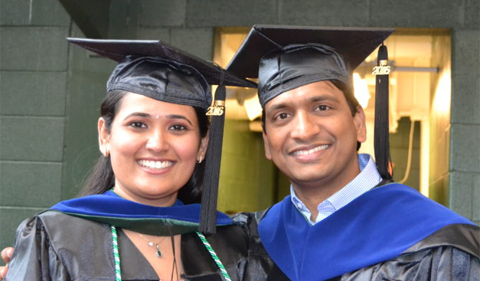
Sneha Pandya and Ramana Thota
By Samantha Peko
NQPI editorial intern
For many college students, graduation is the yellow brick road at the end of a long journey. However, after they’ve crossed it, many may wonder what awaits them next. Some go into academia while others opt to work in other fields. For those interested in industry, it may pay to have connections.
“Bring OUr Alumni Back” is a newly created program started by the Nanoscale & Quantum Phenomena Institute. The program was inspired by visits of various alumni to the department in previous years. One such graduate to return to OHIO to share her industry experience was Petra Stumm, who received her doctorate in Physics & Astronomy in 1997 under NQPI member and Distinguished Physics and Astronomy Professor David Drabold’s supervision. She is manager of product and platform engineering at Advanced Micro Devices, a semiconductor company. She presented at the CMSS Colloquium Series last year on “Microelectronic Product Development.” During the visit, she also met with the Women in Physics group.
Listening to alumni experiences can often inspire current students to explore their options and take on new opportunities.
Ramana Thota, a process engineer at Intel Corp. and recent graduate in Physics & Astronomy with a doctoral degree, attended academic conferences where he had the opportunity to meet with people from different venues.
Thota studied photolithography while a doctoral student at OHIO with NQPI member and Physics and Astronomy Professor Eric Stinaff, who is an expert in nanophotonics. Photolithography involves making patterns on a substrate using light, he explained.
From synthesizing nanoparticles to nanophotonics, the understanding of physics allows for the development of many practical applications.
Thota said he is enjoying the new job, which started last January. He is developing the next generation of materials and processes that will advance the scope of applications based on nanotechnology.
Physics and Astronomy doctoral graduate Sneha Pandya said she had aspired to work at Intel since her second year of study. She said she spent a lot of time networking with alumni to help plan her next step. Now Pandya, who graduated in 2016, works at Intel as a process engineer.
While a graduate student at OHIO, Pandya worked with NQPI member and Physics and Astronomy Professor Martin Kordesch, developing a technique to distribute nanoparticles. The technique was featured in NQPI’s fall 2015 newsletter.
Although important, making connections come second to being able to work independently, a trait that Pandya says is indispensable to impress future employers. “My Ph.D. has not only helped me get the job, but also do the job,” Pandya said. At Intel, she’s working at applying her skills by processing semiconductor chips.



















Comments